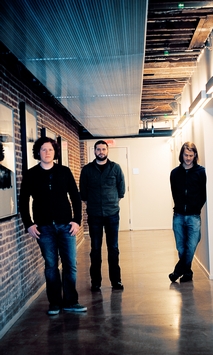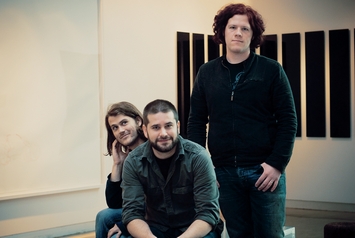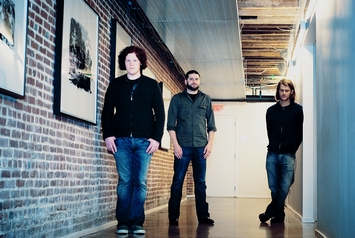social bookmarking tools:
 |
|
| Available RSS Feeds |
|---|
 - Top Picks - Top Picks |
 - Today's Music - Today's Music |
 - Editor's Blog - Editor's Blog
|
 - Articles - Articles
|
Add Louisville Music News' RSS Feed to Your Yahoo!
|

COINCIDENCE OR FATES INTERTWINED?
THE AMAZING SIMILARITIES BETWEEN LOUISVILLE'S
YOUR BLACK STAR AND FOGHAT!
By Tim Roberts
They are Both Obliquely Connected to a Cartoon Character
Call Jeremy Johnson's cell phone and if he doesn't answer you'll hear this:
I go to a different drummer. Like a 30-minute drum solo. Like that dude from Foghat. That's my drummer. The guy from Foghat. Dugga-duh-gugga-duh. Dugga-duh-gugga-duh. Dugga-duh-gugga-duh. Then the guy, the lead singer comes in and says, "Hey, on bass guitar." Dugga-duh-gugga-duh. You know and then he, uh, announces all the band members. Well, that's my drummer, all right? Not your stupid little poom-poom-ssss-poom-poom-ssss. I dunno his name, but he's really good.

The speaker is Carl Brutananadilewski, the bald neighbor in flip-flops, a tank-top tee-shirt that barely covers a roll of gut that hangs over the band of his sweat pants, a gold chain, a Joisey accent that's thicker than the sand outside Asbury Park after the tide goes out and body hair that pokes through his skin like unbent paper clips, who lives next door to a brainless ball of meat, a delusional, cruel milkshake cup and a hovering box of french fries with superpowers and a moustache and goatee in Cartoon Network's Aqua Teen Hunger Force.
Carl is a big fan of the 1970s rock band Foghat. And, obviously, the drummer Roger Earl (whose name Carl can never remember). Anyone tuned into their favorite AOR FM radio station back in that decade would likely catch one of the many Foghat tunes when they came up in rotation: "Slow Ride," "I Just Wanna Make Love to You," "Driving Wheel," "Fool for the City." In the car, the volume knob would get nudged up a few notches whenever one of their songs came on the radio (or if the driver had shoved a copy of Stone Blue into the 8-track player). Their music had drive and power, a rawness that could never be entirely polished up in the studio, like the hands of an earnest car mechanic who can't get the grease entirely out of the ridges of his hands.
So does the music of Your Black Star, consisting of guitarist and lead vocalist Johnson, drummer Drew Osborn and bassist Brandon Duggins.
Their sound isn't what you would hear hammering out of a blues bar or from the garage of the kid down the street. It isn't Music to Slam Dance By, either. There's a dark, airy sensuality behind it and a whisper of anger that fuels it. It's what Catwoman might listen to before she pours herself into her costume before a night out slipping into rich folks' homes and relieving them of some useless, expensive trinkets.
"We do a really good job at what we do," Johnson said. "We're a three-piece band that sounds like we've got more members. We work really hard to come in and just be as loud and together as we can. And I think we put on a pretty good live show."
While those "pretty good" live shows aren't performed much in their hometown, audiences in other parts of this nation and the world (specifically Japan and Australia and the United Kingdom) have enjoyed appearances by Your Black Star for the last two years on a tour schedule that finally ended last August, proof of the unwritten rule of Making It Big as a Band: some people (if any) in your hometown might have heard of you, but it seems that everyone else throughout the globe thinks you're the best thing since spice racks.

"I think that we're a band that people know exists," said Johnson, "but I don't really think we've made an impression here as we have other places. It's funny because people that I know, know about us. They read stuff about us. We get written about in LEO, Velocity, or the Courier-Journal with relative frequency. We're a band that people in Louisville know about, but don't necessarily know. It's bizarre."
They Both Started From Other Bands
The 600 through 800 blocks of West Main Street in Louisville are full of pockets of art: a bronze statue of late mayor Charles Farnsley with his arm across the back of a bench, a row of red penguins standing at attention across the molding of the Proof restaurant around the corner from the 21c Museum Hotel, a large, barrel-chested fiberglass sculpture of Daniel Boone with one arm missing and half his face scarred, bronze replicas of Louisville Slugger models used by Cobb, Clemente, Gehrig, Richardson and others, ending with the 120-foot-tall Louisville Slugger bat at the Hillerich and Bradsby plant and Slugger Museum, across the street from a tower of round, off-center discs that looks like a stack of hatboxes ready to tip over: the memorial to the lives lost during 1890 tornado that tore through the city from Parkland in the western portion up through Crescent Hill in the east.
We were in a coffee shop tucked into the midst of all the sidewalk art exhibits in one of the old buildings on Main Street, a place called Buzz Worx: a narrow but cozy spot with an exposed brick wall on one side and windows on the other that looked out into the building's lobby. The place was set to close at the end of the month.
Appropriate, then, on a street filled with a variety of art in a place that was set to close in less than four weeks that we discussed the band's work, their transitions and how the end of one group dovetailed perfectly with the beginning of their own.
"Drew and I have known each other since seventh grade," Johnson said. "We'd been in bands together since then. We were in a band for a long time called The Helgeson Story for about five years. When that band broke up, Drew and I still wanted to play together, so we started Your Black Star.
"It was definitely an experiment. I'd never sung before. It definitely took me a long time to figure out how to do it right. There are a couple of records we have out there that I wish we didn't," he admitted.
During its time as a band, The Helgeson Story was best known for its long songs that bordered on experimental with lots of moody guitar ambience and vague lyrics, all encapsulated in their release No Mail Days Are Sad Days from early in the decade.
"We were coming from a four-piece band into a two-piece," said drummer Osborn. "We were the rhythm section. With Helgeson we were doing nine-minute songs."
"We weren't the songwriters in the other band," Johnson said. "So for us it was all about technicalities and how to make this song that someone else wrote cool. So I think coming into this band, there was a lot of being stuck on that. And once we learned how to write songs, we figured out it was what we should be doing."
Even after the two learned to write songs, there was still the question of what kind of songs they wanted to perform.
"The funny thing is that our early stuff is angular, that indie rock where it's not quite commercial-sounding," Johnson said. "From the beginning of this band, we wanted to write pop songs, but we didn't know how to do it. For us it was a real turning point when Kevin [Ratterman] agreed to join our band and he asked why we're playing that kind of music, why we weren't writing the kinds of songs that we would listen to."
It is common for a band to rotate their roster of rhythm musicians. Your Black Star had bassists join, then leave. Ratterman, however, stayed with the band long enough to provide advice and a direction.
"He definitely helped me in terms of my voice," Johnson said. "He taught me to not write a part and then try to sing it, but try to do what my voice would naturally do. It was awesome and helpful, but also think when he left there was certainly a bit of doubt if we could do it without him. I feel like he helped us get in the right direction. All that touring and stuff really paid off."
To complete the lineup, the band locked in their permanent bassist Brandon Duggins after Ratterman left.
"I saw a show with them," Duggins stated, "and Kevin was leaving the band. I'd known them from being in other bands and playing shows. I think there were a few beers involved and I volunteered to fill in for a little bit.
"That was four years ago. I'm still filling in."
Foghat, meanwhile, was formed after lead singer and guitarist "Lonesome Dave" Peverett, bassist Tony Stevens and drummer Roger Earl (dugga-duh-gugga-duh) left the band Savoy Brown. They also had lots of personnel changes.
Your Black Star Has Released Two Albums (So Far), As Did Foghat. . .Plus 15 More!
Ask parents which of their children are their favorites and you'll get either a dirty look and/or the pat answer, "They're all my favorites."
Unfortunately, many bands can't give that same answer. Including Your Black Star. Even though there are a couple of early releases Johnson had wished weren't available as part of their catalogue, he claims the band finally found its voice with Sounds from the Ground, released first in Australia and Japan in 2005, then in the UK and US in 2006.
"With Sound from the Ground it was a complete 180 for us in terms of direction and what we were doing," said Johnson. "We looked real hard at what we were playing and realized that this was the kind of music we would listen to. Its kind of like a product of the environment, what we really wanted to be doing."
Their 2007 follow up augmented that feeling.
"With Beasts, we really hit our stride," Johnson said. "We let off a lot of aggression. It was a pretty powerful moment, I think, for us as a band to realize. We were really angry. We had been putting out a lot of work. Asking if this was really making a difference, was anyone really paying attention. We had to get it off our chests, realizing we were working really, really hard. Sometimes it pays off, but a lot of times it doesn't. It's about realizing why you're doing it. We're doing this because it's really satisfying to us."
The same was probably true of Foghat.
Your Black Star Played the South-by-Southwest Festival Three Times, While Foghat Traveled in a South-by-Southwest Direction Three Times. . .Maybe More!
The Austin, Texas South By Southwest Music Festival has grown from a weeklong showcase of independent music to a media even that is starting to dwarf the Sundance Film Festival. Bands no longer just attend a few music business seminars and get noticed and maybe signed to a quickie deal. They now get courted by friendly strangers in black SUVs, music fans forego sleep in order to maybe catch a glimpse of Eddie Vedder taking in some act made up of transgendered Buddhists from a commune in the northern tip of Idaho and the number of seminars available looks like the course catalog for a small college.
Your Black Star has played the festival three years in a row. Foghat hasn't.
This year, however, they didn't. Instead, they did travel to Austin at the same time the festival was running, but this time only to record the first half of their next release entitled Workers.
The choice to skip the festival this year and start to make a recording was based on the band's need to take some time off and come up for a few gulps of sweet air after two years of touring.
"We decided to take a year off," Johnson said, "because we don't have anything to promote. We ended about two years of pretty intense touring in August and took August through February off and just wrote a new record. It was awesome to be able to be home and write. Worrying about trying to write while also worrying about what dates are coming up or how long we have, I think we just needed a break. We'd played around 200 shows. Considering that we don't have a booking agent and that it's all done by us, that is a lot."
Their return to Austin was to record only the first half of Workers and to enjoy the festival as fans instead of performers. Also go to where the free drinks were.
"We'll ultimately record it all there," Johnson stated. "We didn't do it all at once because of our budget. We definitely wanted to get out of town to do it. It's a lot easier to focus and be there just as a group. Recording at home is weird because you mix in friends and work schedules. It can be great if you want to spend a lot of time on a record. Having done both a this point, we realize the way to do it for us is to do a lot of pre-production at home, get the stuff together, demo it ourselves, then do as much as we can live and as quickly as possible in the studio."
There will also be a nearly imperceptible difference in the sound for the new recording. Nothing drastic, as if they were abruptly switching their sound to rhythm-and-blues ballads and Johnson has found his inner Peabo Bryson. For Workers, though, the music is cut through with a tinge of hard rock.
Like you might hear in a song by Foghat.
"It's way more groove-oriented," said Osborn. "Not in a weird, trippy way. It's more throbbing."
"It's a lot more concise," Johnson added. "There are fewer parts to the songs."
Osborn continued. "It's more like taking one or two parts and fleshing them out all the way. It's like finding a groove and elaborating on it."
"The real change will be in the guitar," Johnson said. "The rhythm section will just be locking it down. The idea behind the title is that this is a study of what life is, with workers in a literal sense and in the grand scheme of things where everyone's in their own cycle and just pounding it out.
Indeed, the difference in sound is in Johnson's blowtorch guitar solos that slice through the band's trademark echoey ambience, while at the same time giving that ambience its place. The sound that a fan of Your Black Star would expect gets breathing room it deserves. Only this time, there's a party starting to happen. And they're looking for someone to bring a couple more bags of ice.
"It's a lot less angry and bitter," Johnson said. "It's got that urgent, live sound, but it's a lot more joyous, I'd say."
It could be that with Workers, Your Black Star will have found its "Driving Wheel."
Musicians can often get caught in that intersection of what they need to do to develop as professionals, to feel creative and productive and what their fans expect. Fans can be fickle or consistent, open-minded or rigid. But musicians need to evolve in their sound and approach to the music and, when playing shows, be adaptable to changes in venues, audience sizes and in their own creative direction if they want to stay fresh.
"We have discussed where we've changed," Johnson said. "It's just been an evolving process and every record we do sounds different. [And] whether you're playing a coffee house or if you're playing a large club in Tokyo, you can find a way to make it work for you. And by not being stuck in a necessary routine, you can be consistent regardless of any inconsistencies surrounding you.
"I think that's the kind of band we are."
You can find out what kind of band Your Black Star truly is by visiting www.yourblackstar.com.
